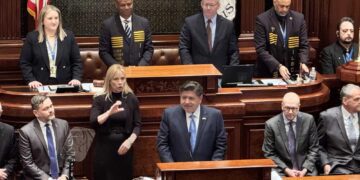By Nancy Thorner -
On Monday, March 22, 2021, The Heartland Institute and the Media Research Center held a Zoom webinar at 1:00 p.m. CST, on how to defeat Big Tech censorship, titled, Toe to Toe with Big Tech Titans: How states can protect freedom of speech. View the Zoom video here.
Part 1 featured Brent Bozell, founder and president of the Media Research Center, as posted at Illinois Review on Monday, April 4, 2020. Part 1: Brent Bozell Discusses the Greatest Threat to Freedom.
Part 2, to follow, will feature comments made by Heartland Institute experts James Taylor, President of The Heartland Institute, and Cameron Sholty, Heartland’s Director of Government Relations.
James Taylor
For Mr. Taylor, the most important thing for state legislators and the general public to understand — because we have been told this myth over and over again — is that Section 230 precludes states from passing legislation that would protect people's free speech rights on the Internet.
Said Taylor: “Yes, federal law preempts state where the two conflict, but Section 230 does not give tech giants (the tech cartels) the right to censor political free speech. This is something the tech giants (the tech cartels) have given a lot of money to a lot of people and a lot or organizations on both sides of the political aisle to lay claim to.”
Looking at the statute
Explained Taylor: “Section 230 is part of the Communications Decency Act of 1996. The Act suggests that Congress was concerned at the time about the ability of people to post excessively violent or sexually obscene material on the Internet."
“Whereas Congress wasn't going to prohibit that, we [Congress] understand that the hosts of Internet social media sites may wish to prevent sexually obscene or excessively violent material on their websites."
“We don't want them fearing lawsuits by doing so, so we are going to place this Act that says that If such a platform decides to block the above, they can do so and don't have to fear tort claims.”
Section b3 of Communications Decency Act of 1996 explained
Taylor went on to explain further by reading Section b3 of the Act.
“It is the policy of the Act to encourage the development of technologies which maximize user control over what information is received by individuals, families, and schools who use the Internet and other interactive computer services.”
“As such, the b3 section of 230 explicitly says the purpose is to maximize user control, not Facebook control, not Google control, not platform control.”
Section C of the Communications Decency Act explained
Taylor then addressed this question: "Under what circumstances or what justification do the tech giants claim they have this mandate that they can block anything they want under any circumstances?"
Taylor again referred to the Communications Decency Act of 1996 under Section C, whose title is Protection for Good Samaritan Blocking and Screening of Offensive Material.
As Section C states: "No provider or user of an interactive commute computer service shall be held liable on account of any action taken voluntarily in good faith to restrict access to or availability of material that the provider or user considers to be obscene, lewd, lascivious, harassing or otherwise objectionable, whether or not such material is constitutionally protected."
Said Taylor: “That last phrase of Section C, ‘otherwise objectionable’, is what the tech giants are hanging their hats on. Keep in mind that it's under a bill that's a communications decency act. Furthermore, Good Samaritan blockage under Section C of the bill must be either sexually obscene of excessively violent, otherwise you don't have the blanket authority to play God in terms of what you do or don't allow on the Internet. The statutory language of the bill makes this so.”
Attacking a myth
“It is based on myth that tech cartels have the right to play God through the organizations they fund, through putting out papers and statements, and also what is heard on Fox News or MSNBC or CNN.”
“State legislators need to know it's not true. You have the ability, if you so choose, to put into place legislative causes of action, legislative prohibitions against tech cartels restricting political free speech for the citizens of your state.”
“If the tech cartels decides that they would like to invoke Section 230 fine, let them show that what they are prohibiting is sexually obscene or excessively violent; otherwise, they do not have that right whether their talking heads say so, whether the public policy organizations they fund say so, or whether they themselves say so. It doesn't matter, that is what the law is.”
Free market solution
In talking about The Heartland Institute, Taylor emphasized Heartland's belief in promoting, developing, and discovering free market solutions to societal problems.
As much as Taylor was offended seeing public figures and elected officials banned from presenting information to their constituents, he was even more offended seeing common citizens who don't have access to their own website, or access to speaking on cable news, being banned from sharing their political views on Facebook and Twitter and elsewhere.
Still Taylor thought, “Well, hey, this is a problem the market will solve. Someone will see that there is a market, and they can build a competitor to Facebook and Twitter.”
“The market succeeded. Parlor was built, put on-line, then the tech cartel destroyed it. Parlor may or may not be able to come back in some way, shape, or form, but that shows that in this case we don't have a free market.” Nevertheless, Taylor still believes in the market.
Concluding thoughts
“230 does have good intentions. It allows people to say if I'm hosting a platform, I don't want on my platform excessively violent, lewd, lascivious, or obscene material.”
“Now, however, multinational corporations think 230 gives them a blank check to tell Americans what they can say, think, and share of our political speech with our friends, our neighbors, and even our elected officials communicating with us.”
To Taylor this is a huge problem. When the market did step in to solve it, the cartels smashed it. It is Taylor's hope that state legislators who are perhaps watching this video, as well people throughout this country who are watching, will understand the following:
“We are powerless only if we allow ourselves to be powerless, but we can stop in, we can take action, so that our free speech rights, which are the first and foremost right that we must cherish and protect in this country, will continue to be protected even against multinational tech cartels."
Cameron Sholty
Cameron discussed what we are seeing in the states and what some of the legislators have been working on.
Sholty indicated that currently 28 states are looking on about 47 bills or resolutions related to this issue. TN is leading the charge. Kentucky, Missouri, and Texas are also looking to rein in big tech.
Four Approaches
As to how the states are dealing with Big Tech, Sholty noted the following four different strategies:
1. Creating a Cause of Action
2. Empowering AG's to investigate/bring penalties
3. Withhold Economic Development Tax Credits/Payments
4. Canceling contracts
"#1 is the most common approach, which basically allows individual users of a social platform to sue Twitter, Facebook, and You tube only for censoring religious or political speech."
"#2 is similar to what you would see in an antitrust lawsuit if there is a big company that is distorting the market and is acting monopolistic. In these cases, state Attorney Generals, or the Consumer Protection Agency in a state, are empowered to investigate and bring penalties."
#3 is one of the more creative ones in Cameron's opinion. As happens in this example given: "When Amazon announces to the world that they are going to open a new distribution or a second or 3rd headquarters, states will trip over themselves to have Amazon build these large massive facilities and to employ the residents of those states. They do it with tax credits or outright payments to Amazon. If determined through investigation by the state's AG, they will withhold tax credits and those payments."
Where we are now
Opposition Obfuscation
- Section 230 authorizes state action
- The free market that isn't
- Narrow interpretation of 230 will preserve Free Speech
- What hearing in states: These bills will allow for child predators and terrorist's content. This was refuted
Said Cameron: "Regarding bullets points 1 and 2, just because Congress deems a market free does not a free market make.”
"The fact that Section 230 exists is prima flash evidence that it's not a free market. Free markets exist separate and precede legislation, so legislation saying something's a free market doesn't make it so."
"Bullet point 3 is what will preserve the free speech of users on the social media websites."
Concluding thoughts
“Facebook, Twitter, and all claim to have 1st amendment protection to act or to censor, but this goes back to the point that they have 1st amendment protection in so far by what has been granted to them in Section 230. Section 230 sees big tech curators of content, not publishers of content, therefor the 1st amendment applies differently and more narrowly.”
“Our instinct is to always censor if we don't like something. The answer is not to censor. The answer is simply, if we do not like speech political or religious speech, or if we find it disagreeable, or if we want to, or if we don't like it and our instinct is to censor, our instinct ought to be that we need more speech.”
"The best antidote to speech with that which we disagree is more speech."
Questions were received throughout the Zoom Webinar event and then fielded by Jim Lakely for response by Brent, James and Cameron.
Related







